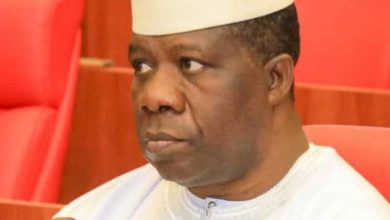Inside Hadiza Bala Usman’s Tenure: Contract Breaches, Court Order Defiance, and Arbitration Violations as NPA MD

We have noted recent public statements made by Ms. Hadiza Bala Usman, who was dismissed from her role as Managing Director of the Nigerian Ports Authority (NPA). She accused BUA Group and our Chairman, Abdul Samad Rabiu, of violating a concession agreement and misrepresenting facts in her comments. The claims were made in response to our Chairman’s interview and article, “Two Years of President Tinubu: A Business Perspective” (watch at https://bit.ly/pbatbua), which praised Nigeria’s reform trajectory and referenced past instances of arbitrary disruptions to business operations without naming anyone. This situation has been curtailed by President Tinubu’s firm approach to restoring sanity and stability in Nigeria’s business environment.
Under normal circumstances, we would not involve ourselves in this matter. However, the inaccuracies in her reply require a factual clarification, particularly concerning her conduct while serving as MD of the NPA.
THE AGREEMENT AND HER OMISSIONS
In 2006, BUA and the NPA established a valid long-term lease agreement for the rehabilitation and operation of Terminal B at Rivers Port in Port Harcourt, Rivers State. Even prior to Ms. Usman’s appointment, BUA had initiated formal discussions with the NPA to tackle unresolved remedial tasks and infrastructure shortcomings. When she took office, these discussions were close to concluding.
Instead of developing that process, Ms. Usman overlooked BUA’s requests and obligations as outlined in the agreement. In 2016, BUA sent a letter to the NPA based on Article 8.4 of the lease, which required concessionaires to report environmental and safety issues and obtain approval for remedial actions. Instead of taking constructive action, Ms. Usman exploited that letter as a pretext to issue a termination notice and abruptly shut down the terminal, doing so without any prior warning, consultation, or reference to the dispute resolution clause.
In her response, she either forgot or did not mention that the NPA, under her leadership, was in material breach of core obligations such as failing to hand over critical portions of the port, leaving derelict iron ore on the berths, neglecting to dredge or repair quay walls, and not providing mandatory security. These lapses significantly hindered BUA’s operations, resulting in disputes between the parties.
ILLEGALITY, CONTEMPT, AND DISREGARD FOR CONTRACTUAL MECHANISMS
Following the illegal termination, BUA went to the Federal High Court, which quickly issued an injunction preventing the NPA from moving forward with the termination. The NPA subsequently referred the dispute to arbitration, as specified in Section 17.3 of the agreement, which states clearly:
“Any dispute, controversy, or claim… shall be settled exclusively and finally according to the dispute resolution process outlined in this Article.”
Nevertheless, Ms. Usman, contrary to her agency’s counsel, took it upon herself to decommission the berths, which constituted a breach of both the agreement and a court injunction. For clarity, the concession agreement did not grant her any power to decommission. Should she hold a different belief, we encourage her to publicly reference the exact clause that permits this action.
To add to the illegality, BUA—after supplying the guarantees and indemnities sought by the NPA—was allowed to resume operations for a short time. Just three weeks later, the terminal was closed again, this time under Ms. Usman’s orders. This eliminated any doubt that her actions were driven by personal animosity and an abuse of office, rather than by due process.
Afterward, BUA initiated contempt proceedings and was assessing estimated losses exceeding $10 million. The only reason these proceedings were withdrawn was the respect for national interest and the intervention of well-meaning Nigerians, both within and outside the government.
PRESIDENT BUHARI’S ACTIONS WERE BASED ON FACTS AND LAW—HE WAS NOT MISINFORMED
Ms. Usman’s assertion that former President Muhammadu Buhari was “misinformed” when he overturned her actions is inaccurate, disrespectful, and insincere.
After a meeting in 2018, which our Chairman was privileged to hold with President Buhari, he brought the issue to the President’s attention. The President then instructed the Office of the Attorney General of the Federation to carry out a comprehensive legal review and investigation of the matter. All parties, Ms. Usman included, were invited by the AGF to multiple meetings. At none of these events did we see her. Regardless, the AGF moved forward with an exhaustive examination of the contract, the litigation, the arbitration clause, and all communications and actions taken by BUA and NPA. The attached legal advice concluded that the termination was illegal, the decommissioning lacked legal justification, and BUA’s rights should be restored. With this as a basis, President Buhari commanded that her illegal actions be undone. His involvement maintained the contract’s sanctity, saved more than 4,000 jobs, and protected BUA’s $500 million integrated investment cluster that included flour, pasta, and sugar processing facilities reliant on terminal access. We are profoundly thankful to ex-President Buhari for this.
Read Also: Vice Principal Beaten by Alleged Thugs Hired by Parent for Stopping WAEC Exam Malpractice
As mentioned by our Chairman in his interview, imagine if he didn’t have the privilege of access. However, under President Tinubu’s leadership, this culture of impunity has been significantly reduced, as many recognize that abusing their positions could lead to dismissal or imprisonment.
POST-HADIZA: DUE PROCESS REINSTATED, INVESTMENT CONTINUED
After Ms. Usman was removed from her position, the NPA adopted the AGF’s stance under new leadership. In 2022, BUA received official authorization to continue reconstruction activities. After TREVI was awarded the contract, BUA made investments exceeding $65 million—this was entirely self-funded and did not rely on public funds or subsidies. The work is in progress, and it is anticipated to be finished by the first quarter of 2026.
THE ACTUAL THREAT: INVESTOR ASSURANCE AND LEGAL PRINCIPLE
It must be made clear that this issue extends beyond BUA. If Ms. Usman’s actions had been permitted to remain, it would have conveyed a catastrophic message that contracts in Nigeria hold no value, court orders can be disregarded at will, and individuals or public institutions may take unilateral action without facing repercussions. It is imperative that we do not go back to that time. The success of Nigeria’s reforms today is based on the principles of honoring contracts, ensuring due process, and fostering investor confidence—principles that are being reinstated under President Tinubu’s administration. During this administration, BUA has pledged more than $1 billion in new investments in sectors such as energy, food processing, manufacturing, infrastructure, and social interventions.
We want to stress that Ms. Usman has the right to her opinions, no matter how distorted they may be. Nevertheless, she does not have the right to misrepresent the facts or alter history. Our intention is not to instigate a public quarrel; rather, we hope she will focus on her responsibilities in her new position, guided by President Tinubu’s robust leadership. We thus reiterate the facts that Ms. Hadiza Bala-Usman lacked the authority to unilaterally decommission Terminal B. Her actions disregarded a court injunction and contractual procedure, resulting in significant economic losses exceeding USD 10 million, reputational damage to BUA, and investor concerns regarding Nigeria.
The essence of our message has not changed: public office ought to be regarded as a role that requires trust, not as an opportunity to promote personal prejudices. It is essential for those who have been given public authority to withstand the urge to allow their actions to be shaped by bias, self-importance, or revenge.
Should Ms. Hadiza Bala-Usman feel that her actions were lawful, we invite her to point out the exact clause or clauses that informed her unlawful behavior. If not, allow the facts to stay in their rightful place: the public record.





